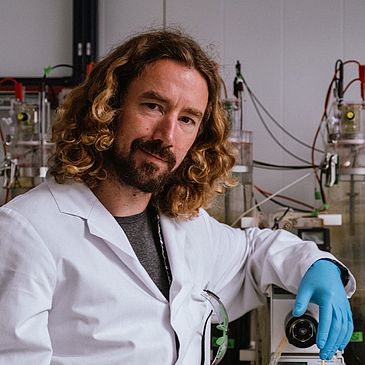The natural dissolution of mafic silicate rocks (e.g. dunite) and carbonate minerals in the marine environment increases alkalinity and draws down CO2. Consequently, large-scale manual dispersal of such minerals has been proposed as a potential measure to alleviate rising atmospheric CO2 levels through ocean alkalinity enhancement (OAE). This study investigates the effects of biogeochemical processes on alkaline mineral dissolution in surface sediments in a controlled experimental environment. Dunite and calcite were added to the surface of organic rich sediments from the Baltic Sea in order to simulate mineral dissolution and OAE under oxic and unoxic conditions. Three sets of experiments two under controlled laboratory conditions and one benthocosm experiment were set up.
Results indicate that the addition of the two materials directly increased benthic fluxes of alkalinity and other respective weathering products such as calcium and silicate compared to the control experiments. These enhanced fluxes were considerably higher for calcite compared to olivine additon. The main driver for enhanced and natural weathering is undersaturation with respect to the dissolving minerals which appears to be governed by microbial activity.
In the oxic laboratory experiment, very low pH values (~5.6) produced by presumably cable bacteria at ~1-3 cm depth in the sediment led to strong calcium carbonate dissolution. This microbial activity lead to additional TA fluxes that partly disguised enhanced calcite dissolution. Enhanced dunite weathering was indicated by slightly enhanced sedimentary Si fluxes, although this proved difficult to discern from the natural background flux arising from biogenic opal dissolution. Under anoxic conditions as well as in the benthocosm experiment the increased fluxes were more distinguishable from the natural background.
The overall natural complexity of the sediment chemistry combined with the alteration of the sediments during the experiments complicate a clear disentangling of natural and enhanced mineral weathering. Further investigation of these sedimentary systems along with field experiments will be necessary to provide estimates on the feasibility of benthic weathering as a realistic OAE and climate change mitigation measure.
Michael Fuhr is a PhD student in geochemistry at GEOMAR Helmholtz Centre for Ocean Research Kiel. He researches the possibilities of accelerating naturally occurring weathering in marine sediments to enhance the long-term storage of CO2 in the ocean. His main topics include geochemical analysis, experimental geochemistry and geochemical modelling.

